Some months ago we found a small green photo album chock full of Portuguese vintage snapshots of an anonymous male, a well-loved only child of older parents. The album follows his life from his birth in the early 1930’s until adulthood in the ’40s. We named this boy “Nuno,” and after many hours of examining, scanning and restoring his photos, I felt as if I knew him. I wondered of his life after he left home. Was he happy? Did he find love, family, meaningful work? I also found myself thinking a lot about boys, having raised three girls myself. What does it mean to raise a boy? Is it any different than raising a girl? Should there even be a distinction? I asked some artists and writers who happen to be parents of boys to weigh in. The following are their reflections, illustrated with images from Nuno’s album. (To see the whole Nuno album and in a larger format, go here).
—Paper Ghosts
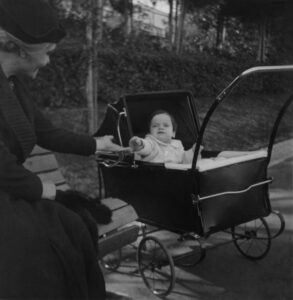 How many of you have noticed the silly grin of a new father? My son — my firstborn —was presented to me whilst “still connected” to his mother. There in my arms was the future, and the extremely silly beaming smile happened instantly. My wife now safe in the hands of the midwives as I held my long-time friend-to-be, with whom I could share his adventures, hopes and fears, bask in his successes and the thrill of being alive. Here was someone I yearned would relish the positive parts of his being and not be too troubled by the disappointments and potential dejection life brings. I wore this silly grin of expectation with both my newborn children, and I always wear that grin with pride. It is pure, unadulterated hope.
How many of you have noticed the silly grin of a new father? My son — my firstborn —was presented to me whilst “still connected” to his mother. There in my arms was the future, and the extremely silly beaming smile happened instantly. My wife now safe in the hands of the midwives as I held my long-time friend-to-be, with whom I could share his adventures, hopes and fears, bask in his successes and the thrill of being alive. Here was someone I yearned would relish the positive parts of his being and not be too troubled by the disappointments and potential dejection life brings. I wore this silly grin of expectation with both my newborn children, and I always wear that grin with pride. It is pure, unadulterated hope.
— Barry Chattington
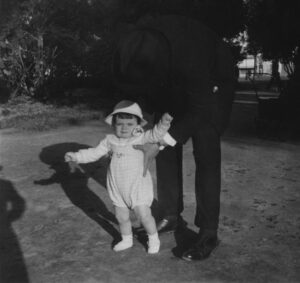
Among my prized possessions is a sacred artifact: a small, rolled-up tube of glossy receipt paper. Upon it, a grainy black-and-white image, proof of the existence of my unborn child. Well into my thirties, I’d resisted the idea of having a child, the goal to avoid it all together. But that day, after hearing that watery fluttering heartbeat for the first time, my avoidance was replaced by intense anticipation. From then on, at the end of each day I would lie in bed beside my wife’s distended belly and speak softly to the little one in utero, waiting for any sign they might hear me, or me them.
One early mid-August morning, the doctors handed me my only child, my son Vince. The memory of his birth still brings tears to my eyes as I write. From that day on we were inseparable. Every minute I was not working, we were together. When Vince was just under a year old, walking but not yet talking, my wife and I decided to move east. I set out in advance to find work and a home for our young family. I thought about Vince every minute I was away. When I would call home in the evening his mother would hold the phone up to him and I would speak, then she would describe his expressions to me, every detail clear in my mind. That week away was the longest week of my life.
Returning home, I remember pulling up in front of our house. I stepped through the front door and called for Vince. First I heard him making his way to my voice, then he peeked out from around the corner. I’ll never forget the look in his big, blue marble eyes. That little round face, his tummy over his diaper as he waddled toward me, his chubby arms raised toward the ceiling in excitement. We hugged and nuzzled, his familiar clean baby smell reassuring me I was home.
—David McConkie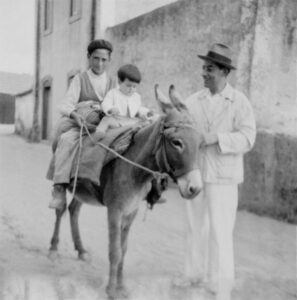
When my boys were little I would take them out into the world either in a carrier or later on my shoulders or on my bike. Always facing outwards. In my bubble, close to my heart, but always facing outwards. As we rode on my bike, in his seat mounted behind the front stem, Ben would say, “Try to avoid the bumps, Dad.” And so I would. And so I did. That was my job, hold them close, let them know I was with them, take them out into the world, give words to what passed before us, and above all, try to avoid the bumps.
—Loring Vogel
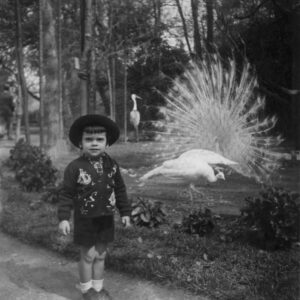
One spring when my two sons were little, we bought them a pair of baby geese, a male and a female. It wasn’t long before the birds were grown. My son Linden, my youngest, liked to play with his goose, and I loved watching as he’d run and the graceful bird flew alongside him. They’d even fall asleep together in the wheelbarrow while I worked in the garden. But the gander of the pair grew into a terror. He was solicitous and courteous with me, but attacked every male he encountered, even the boys. We lived in a trailer in the mountains at the time, and needed to go outside for most everything. That gander had a mean pinch. One day, Linden and a friend decided to exact revenge and build a trap for him. They worked hard, digging a hole, and then waited for him to fall in. The clever gander avoided the trap, and eventually we gave him away, to take over another family’s flock. Linden wrote a story about him called “The Terrible Terrorist Goose.”
— Erle Reed
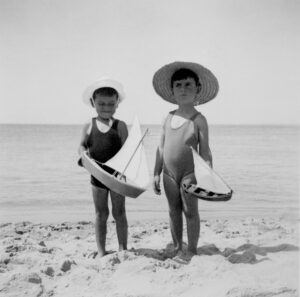 One Saturday morning in August, I loaded my sons Jasper and Jonah into our van to go to the Y for the “special needs stew,” my name for the Adaptive Aquatics program my older son was enrolled in. Ten-year-old Jasper sat strapped in his wheelchair, waiting expectantly. His birth had been traumatic, leaving him partially paralyzed and with cerebral palsy. After a seven-year medical malpractice lawsuit, he’d won a van to cart him and his wheelchair around; a hanging contraption that allowed him to bounce freely around the house; and the option to attend the swimming program at the YMCA. His eight-year-old brother Jonah and I were encouraged to come along. The three of us dudes would happily float in the 98-degree water with other families with disabled children.
One Saturday morning in August, I loaded my sons Jasper and Jonah into our van to go to the Y for the “special needs stew,” my name for the Adaptive Aquatics program my older son was enrolled in. Ten-year-old Jasper sat strapped in his wheelchair, waiting expectantly. His birth had been traumatic, leaving him partially paralyzed and with cerebral palsy. After a seven-year medical malpractice lawsuit, he’d won a van to cart him and his wheelchair around; a hanging contraption that allowed him to bounce freely around the house; and the option to attend the swimming program at the YMCA. His eight-year-old brother Jonah and I were encouraged to come along. The three of us dudes would happily float in the 98-degree water with other families with disabled children.
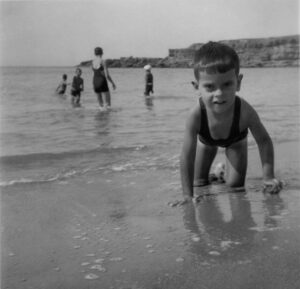 Jasper was the star of the Y, his curly-haired, grinning handsomeness attracting mamas of other motor skill-impaired kiddos, and college girls who’d volunteered to help out. Jonah didn’t mind playing second fiddle to his older brother. The two boys had a tight bond, and as we sat in the van waiting for their mama to bring out their lunch, I marveled at their brotherhood and felt a little envious of it. While I loved my little sister Gina, I wondered what it would be like to have brothers. I turned towards the boys strapped in the backseat.
Jasper was the star of the Y, his curly-haired, grinning handsomeness attracting mamas of other motor skill-impaired kiddos, and college girls who’d volunteered to help out. Jonah didn’t mind playing second fiddle to his older brother. The two boys had a tight bond, and as we sat in the van waiting for their mama to bring out their lunch, I marveled at their brotherhood and felt a little envious of it. While I loved my little sister Gina, I wondered what it would be like to have brothers. I turned towards the boys strapped in the backseat.
“Hey, guys,” I whispered. “I know I’m your dad, but whaddya say we three become brothers?”
Jasper grinned and Jonah said, “Sure!” and we all put our fists over Jasper’s wiry lap and chanted, “Brothers, brothers, brothers for life!” I was now officially part of a fraternity. It felt good, and real.
Jasper was my firstborn. When I’d become a father, I also became a caretaker, nurse, and avid researcher into medical advances that might help my child. All of this was unexpected and out of the ordinary but I never questioned it. Becoming a brother to my sons was just another role I could play. With Jasper, the unexpected was the norm.
Later that year, Jasper died in his sleep from a grand mal seizure, and our brotherhood was obliterated forever. Jonah and I retreated to roles of father and son, and assumed a life of normalcy that didn’t exist when Jasper was still a living, breathing boy. While I’m a happy dad to a prepubescent (sometimes chump of a) son and three curly-haired girls who revel in their wild sisterhood, in our memory of Jasper his gender seems to have disappeared. But it doesn’t matter. It was Jasper who allowed anything to happen— role reversals, lives turned upside-down or inside out, all that magic pre-licensed and welcome and real.
— Jon Gonzales
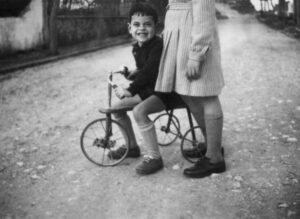
Looking back over her childhood, it never crossed my mind that my daughter Ingrid might be a transsexual, a term she now chooses to describe herself. I can remember a sign my friends had hanging in their kitchen, something about raising boys and girls the same. It was a concept I had never thought about before. At first it was like, duh, of course I would raise them the same. Now I understand how important it really is.
When Ingrid played with Buzz Lightyear or collected Hello Kitty dolls and Beanie Babies, I didn’t consider those to be gender-specific toys. She had long blonde hair and a delicate frame, and sometimes she had to defend herself when kids at the Boys and Girls Club would call her a girl. One time she stuck two Post-it notes on her chest, one that just said “Don’t ask” and another that said “Boy.” Honestly, I never questioned whether she was a boy or not. It didn’t matter to me.
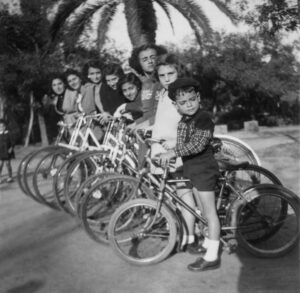 When she turned nine years old, Ingrid’s body started to betray her. Testosterone took over. She started to grow hair in her armpits and groin, along with a rash of pimples. And obviously, her anatomy changed as well, becoming more masculine. If only I had known then that she was a girl. If only we had known about hormone inhibitors. She didn’t understand what was happening to her at first, or where she was on the spectrum of gender, or that even such a spectrum existed. I never dreamed that she would fall into deep, dark depressions, a consequence of what I now understand is body dysmorphia. I was just trying to raise a person.
When she turned nine years old, Ingrid’s body started to betray her. Testosterone took over. She started to grow hair in her armpits and groin, along with a rash of pimples. And obviously, her anatomy changed as well, becoming more masculine. If only I had known then that she was a girl. If only we had known about hormone inhibitors. She didn’t understand what was happening to her at first, or where she was on the spectrum of gender, or that even such a spectrum existed. I never dreamed that she would fall into deep, dark depressions, a consequence of what I now understand is body dysmorphia. I was just trying to raise a person.
Today, Ingrid is a highly-intelligent woman with a multitude of talents. While in some ways she she was unprepared for some of life’s crueler realities, she is an incredibly capable person who navigates her life with a strong sense of who she is. This self-knowledge has nothing to do with her biological parts. And she was still my little boy, at least in that sliver of time. I can’t erase that.
— Cassandra Houghton
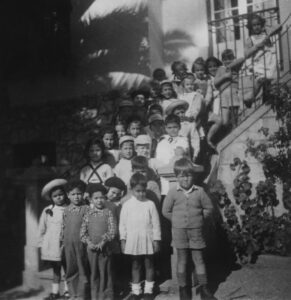 I come from a family of male artists. My father was a visual artist, I am a visual artist, my son, Sasha, is a professional musician and my 5-year-old grandson, Joaquin, is already showing signs of his own creative spirit. I’ve always felt that my role as a father was to act as a bridge from home life to the larger world. Values were to be embodied by example, like honoring one’s agreements, being prepared, arriving on time, listening to others with open ears and an open heart and mind. As I am also a native New Yorker from the Bronx, I’d occasionally throw in a few old school slangers like “Do no harm, but take no shit, either,” an adage I pay heed to myself from time to time.
I come from a family of male artists. My father was a visual artist, I am a visual artist, my son, Sasha, is a professional musician and my 5-year-old grandson, Joaquin, is already showing signs of his own creative spirit. I’ve always felt that my role as a father was to act as a bridge from home life to the larger world. Values were to be embodied by example, like honoring one’s agreements, being prepared, arriving on time, listening to others with open ears and an open heart and mind. As I am also a native New Yorker from the Bronx, I’d occasionally throw in a few old school slangers like “Do no harm, but take no shit, either,” an adage I pay heed to myself from time to time.
As a young boy, Sasha was ambidextrous. I never thought much about it, but his school teachers made quite a fuss over it, insisting he would develop emotional problems as a consequence of being unable to choose between his right or his left hand. They were hellbent on making him right-handed and would use tricks like having him hold a magic crystal in his left (this was California), while he wrote or drew with his right.
I wasn’t having any of their outdated pedagogical nonsense. I had numerous run-ins with his teachers culminating in a nose-to-nose confrontation with his 2nd grade teacher and my Bronx-style warning that she was never again to interfere with his innate two-handedness. I must have convinced her as that was the end of it. Sasha went on to become a truly great pianist, having unusual strength and facility in both hands. He has also grown into an emotionally well-balanced man and father of his own boy.
—Claude Smith
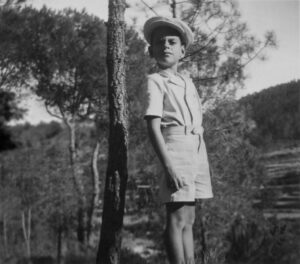
When my son Tyjal was nine, he had a resistant staff infection and spent several days in the hospital. The doctors tried different antibiotics and some seemed to work for a minute but then didn’t. Tyjal soon grew weak, lethargic and feverish. Couldn’t even get him to open his mouth so that the nurse could take his temperature. The pustule’s yellow head on his inner thigh just kept getting bigger. His veins collapsed.
After about the tenth day, as I was entering Tyjal’s hospital room to relieve his mom, I saw the nursing staff scramble to put on full protective gear and masks, as if for some terrible, contagious disease. I felt a wave of fear as my reality changed. I thought Tyjal was lost. I kept my panic from overwhelming me by telling myself I needed to take care of my little daughter, Aja. This also helped me keep myself together to help my son.
He got better.
We went to the park on the first day Tyjal was able to see his friends, and he dragged his still-healing leg toward the group of boys. I have never seen him so excited.
— Art Moura
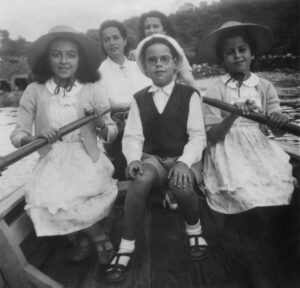
My son Enfys was bold and fearless in childhood, as if he would live forever. Part of me—especially now that he’s a young adult with a soft spot for Greek and Norse Gods—has always believed him immortal. He would climb trees and stairs, run gleefully and with determination down sidewalks and through fields and meadows. Always curious, Enfys took things apart, filled his pockets full of stones at the park and carried them home to examine under a flashlight in his room. He created bold pieces of art. He grabbed microphones and sang his heart out with friends’ bands at parties while still so small that I could carry him on my right hip. He could jump higher than any kid I’ve ever known.
While my friends with boys would often complain about their rambunctious sons, sighing to me that I’d never understand how hard it was to keep up with them, everything they described was exactly what I experienced with my own child. The thing is, Enfys was assigned female at birth. But I was never one to box kids into expectations of how they should behave based on what society expects. When he came out to me as a teen and told me he was not a girl but was, indeed, a boy, I smiled and laughed and said, “Of course you are.” Boy, girl, non-binary, whatever, I like to think my response would have been the same, no matter what.
—Dani Burlison
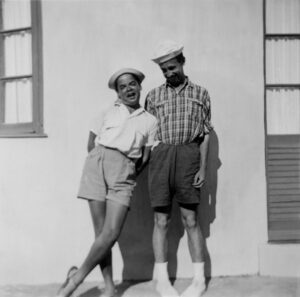
Maybe because where we lived was centrally located and walkable distance from their middle school, my place was where boys gathered as their limbs and whiskers and hormones were growing. It was during the “Jackass” era, a TV show where grown men behaved like idiots, highly popular among boys and lots of men, too. Each episode featured dangerous pranks involving explosives or leaps across chasms or acting like jerks in public places. My son and his friends took it upon themselves to emulate, and one-up, the possibilities. One favorite was them going to the college racetrack during after-school hours when mostly older women practiced race-walking — that funny kind of fast stride where you pump your elbows up and down and shift hips from side to side without ever breaking into an actual run. The boys stood on the sidelines then leapt onto the track in stride next to the women as they came around the bend, much to the ladies’ consternation (but sometimes laughter).
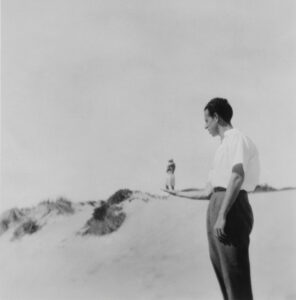 My son had the role of filmmaker at the moment when iMovie technology had just been invented. Another prank the boys liked involved one guy tossing a badminton shuttlecock in the path of walkers on a local trail while another shouted to passersby, “Excuse me, have you seen my shuttlecock?” On other days the boys would limp into the boulevard intersection with crutches, then pretend-fall in the middle of the street as cars were trying to make their turns. This has led to a complete renovation of the pavement lines and crossing patterns, without the boys being cited, or praised, for initiating the new safety measures.
My son had the role of filmmaker at the moment when iMovie technology had just been invented. Another prank the boys liked involved one guy tossing a badminton shuttlecock in the path of walkers on a local trail while another shouted to passersby, “Excuse me, have you seen my shuttlecock?” On other days the boys would limp into the boulevard intersection with crutches, then pretend-fall in the middle of the street as cars were trying to make their turns. This has led to a complete renovation of the pavement lines and crossing patterns, without the boys being cited, or praised, for initiating the new safety measures.
On opening day for “Jackass The Movie,” I was the designated mom who dropped the boys off at the theatre then drove home only to get a desperate call from my son that they could not be admitted without an adult present who would stay for the whole show. I was forced to sit through the entire dumb spectacle in the back row while the boys all sat up front, not wanting to be seen with me. The stunts that matinee inspired led to an afternoon of scratched shins, bruised knees, one open wound, and great cinematography. Luckily, no one was seriously injured in the making of those teenage videos and today my son is gainfully employed by Apple as a motion graphics artist.
— Marianne Rogoff
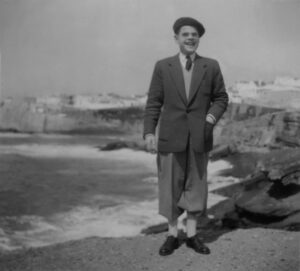
My 34-year-old son just left the house for a quick jog in the park, and once again, I am marveling at the beauty of him, every hard sculpted line of his male form. I never lose my sense of awe that I gave birth to what I consider is the perfect specimen of manhood.
He’s not without his issues, though. I sometimes wonder if the fact that he was born to a single mother affected him in the early gestational stages. I knew he was different from the start. His birth itself was a miracle, as I had received four negative pregnancy tests. I was even given hormones meant to induce a period. Meanwhile, I was experiencing the early symptoms of pregnancy. The hormones failed. I think that little soul wanted most awfully to be born.
Right away we developed a singularly strong bond. I could tell this when the nurses brought him to me at the hospital, howling and screaming louder than any other baby in the nursery. He quieted down the moment he was placed in my arms. Since he is a Leo child, I presume this was his first lion’s roar, making himself heard. Another early and quite eerie sign of our intense bond was his ability to read my mind. When he eventually learned to talk he would finish sentences for me or supply answers to unspoken questions I was mulling around in my head. Stunned, I documented these occurrences over and over again. This carried on through his toddler years, but he eventually grew out of it, which saddened me. But it’s always left me with the certitude that people are able to communicate telepathically, an ability we lose or grow out of over time. He also seemed to be born with a ready-made language, assigning non-English nouns and adjectives to everyday things. I used to look at him and wonder to myself, What planet did you come from?
As the years went on I came to understand that at the root of these peculiarities is the fact that my son is on the autism spectrum. This was not a household term in the ‘80s. After reaching puberty, he struggled with social interactions and sensory stimuli, behavior that seemed to fit the description of Asperger’s Syndrome. He changed his diet, which helped a lot. Despite his challenges, in many ways he is a high-functioning adult, though he will probably always live with me.
One of the great joys of living with my son is how unfailingly polite and formal he is, how bighearted. He never fails to thank me for the most mundane task, which always shocks me. I certainly never thanked my parents for anything, and I don’t know anyone who did this on an everyday basis. I may have taught him to tie his shoes, ride a bike and drive a car, but in return it is he who has given me the real gift of life and taught me everything I know about how to love another human.
— Marie Bottini
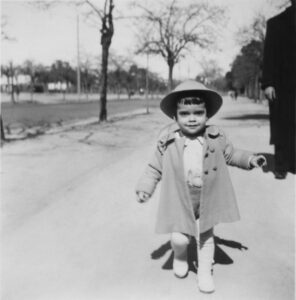
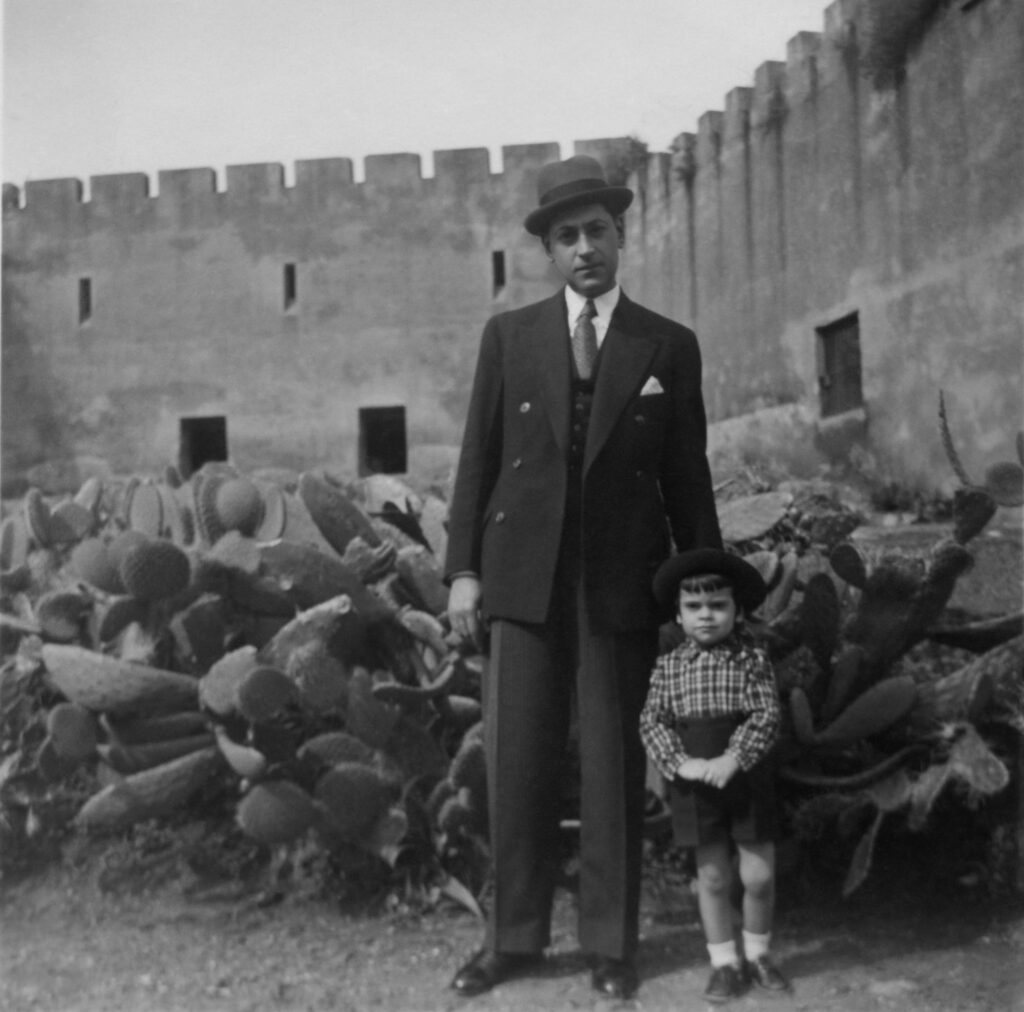
This Post Has 0 Comments